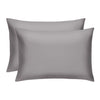The Daily Miracle
Restless Sleep: What It Is and How To Fix It
Published
February 20, 2024
Author
Bridget Reed

Many of us know the frustration of a restless night — tossing, turning, and struggling to find a comfortable spot. This experience of restless sleep is more than a minor annoyance. It has significant implications for our health and daily performance.
And restless sleep is not just a problem at night. It affects our days, too. The consequences of poor sleep seep into our work, relationships, and overall quality of life.
Understanding what causes restless sleep and how to address it is crucial. In this article, we aim to unravel the mystery of restless sleep and guide you toward peaceful nights and energetic days.
Why Is Restless Sleep So Bad for You?
Restless sleep impacts your entire body. Physically, it can weaken your immune system, making you more susceptible to illnesses. It also heightens the risk of chronic conditions like hypertension and diabetes.
Mentally, the effects are equally concerning. Chronic restless sleep can lead to mood swings, anxiety, and depression. It impairs cognitive functions, including memory, attention, and decision-making. These mental health impacts can create a vicious cycle, where anxiety about sleep leads to more restless nights.
Long-term restless sleep can also affect your personal life. It might lead to decreased productivity at work, strained relationships, and a general decline in life satisfaction. Understanding these risks underscores the need for effective solutions to improve sleep quality.
What Causes Restless Sleep?
Restless sleep can be caused by several factors, both internal and external. Stress is a major culprit, as it keeps the mind active and alert when it should be relaxing and preparing for sleep. Environmental factors, such as an uncomfortable mattress or a noisy bedroom, can also disrupt sleep.
Medical conditions are another significant cause. Disorders like sleep apnea, restless leg syndrome, and insomnia can severely impact sleep quality.
Additionally, lifestyle choices play a pivotal role. Poor diet, lack of exercise, and irregular sleep schedules can all contribute to restless sleep. Even your evening activities, from watching TV to scrolling through social media, can interfere with your body's natural sleep-wake cycle.
What Can You Do To Improve Your Sleep?
Enhancing sleep quality isn't just about making a single change. It's about examining and modifying various aspects of both your lifestyle and environment. From the comfort of your bed to your daily habits, every element plays a role in how well you sleep at night.
Let’s talk about some of the main changes you can make to your sleep habits to address restless sleep and ensure you wake up feeling refreshed and ready to take on the day.
1. Improve Your Bedtime Routine
Establishing a consistent and calming bedtime routine is vital. Alongside activities like a warm bath or gentle stretching, consider incorporating practices such as meditation or listening to soft, soothing music.
These activities signal to your body that it's time to rest and help calm your mind, reducing the stress and anxiety that can often interfere with sleep. Moreover, creating a sleep-conducive environment in your bedroom is crucial.
The ideal sleep environment varies from person to person, but generally, it should be cool, quiet, and dark. Consider investing in blackout curtains or an eye mask to block out light and earplugs or a white noise machine to drown out disruptive sounds.
The comfort of your mattress and pillows should also be taken into account, as they play a significant role in ensuring a restful night.
2. Make Better Lifestyle Choices
The impact of your daily habits on sleep quality cannot be overstated. Alongside a balanced diet and regular exercise, paying attention to your liquid intake is important.
Avoiding large amounts of liquids before bed can help prevent disruptive nighttime bathroom trips. Additionally, herbal teas such as chamomile or lavender can be soothing options before bedtime.
Paying attention to your mental health is also essential for good sleep. Activities that reduce stress, such as yoga or journaling, can be beneficial. Additionally, try to resolve any major concerns or plans for the next day well before bedtime to avoid a racing mind.
Reducing or eliminating nicotine and alcohol is crucial. While alcohol might initially induce drowsiness, it often leads to fragmented sleep and prevents deeper sleep stages.
Nicotine, a stimulant, can make it difficult to fall asleep and stay asleep. By being mindful of these substances, especially in the hours leading up to bedtime, you can significantly improve the quality of your sleep.
3. Reduce Screen Time Before Bed
Minimizing screen time before bed is a crucial step toward better sleep. The blue light emitted from screens suppresses melatonin production and keeps your brain alert, making it harder to wind down.
Establishing a “digital curfew” can help to promote a pre-sleep ritual that promotes relaxation. In place of screen time, consider activities that relax the mind and body.
Gentle, restorative yoga or simple stretching can release physical tension. Reading a book or practicing journaling can also be excellent ways to transition from the hustle of the day to the tranquility of the night.
Consider listening to calming music or audiobooks, which can be a soothing alternative to screen-based entertainment. These activities not only aid in reducing mental stimulation but also help in establishing a consistent routine that signals to your body that it's time to sleep.
4. Elevate Your Bedding
Investing in high-quality bedding is a transformative step for enhancing sleep. Our Miracle Made® Sheets go beyond mere comfort by incorporating advanced technology for a superior sleep experience.
The silver-infused fabric not only regulates temperature but also provides an antimicrobial barrier. This unique feature means you are sleeping in a cleaner and healthier environment.
The benefits of our sheets extend to practical aspects of daily life. They require less frequent laundering, saving time and energy.
Their durability ensures they maintain their luxurious feel over time, making them a valuable investment in your sleep health. When paired with our cozy comforter that helps you maintain the ideal body temperature while you’re sleeping, you’ll have everything you need to achieve true bedtime bliss.
5. Embrace Relaxation Techniques
Integrating relaxation techniques into your evening routine can have a profound effect on sleep quality. Deep breathing exercises help lower the heart rate and calm the nervous system, preparing your body for rest.
Progressive muscle relaxation, where you tense and then relax different muscle groups, can be particularly effective in releasing physical tension and mental stress. Guided imagery, where you visualize a peaceful scene or story, can be a powerful tool in diverting your thoughts from daily stresses and easing into sleep.
Additionally, using a weighted blanket can offer a sense of security and comfort. The gentle pressure of the blanket mimics a therapeutic technique known as deep pressure stimulation, which reduces anxiety and improves sleep quality.
For those struggling with anxiety or sensory processing disorders, these relaxation techniques, combined with the sensory input of a weighted blanket, can be especially beneficial. These strategies facilitate quicker sleep onset and contribute to a deeper, more restorative sleep.
The Bottom Line
Restless sleep is a multifaceted issue that requires a comprehensive approach. From lifestyle changes to enhancing your sleep environment, each element plays a crucial role in improving sleep quality.
We encourage you to experiment with these strategies and discover their positive impact on your sleep and overall well-being. Embrace these changes and experience the transformative power of restful sleep.
Sources:
What Causes Restless Sleep? | Sleep Foundation
The Effects of Alcohol on Quality of Sleep | National Library of Medicine




























